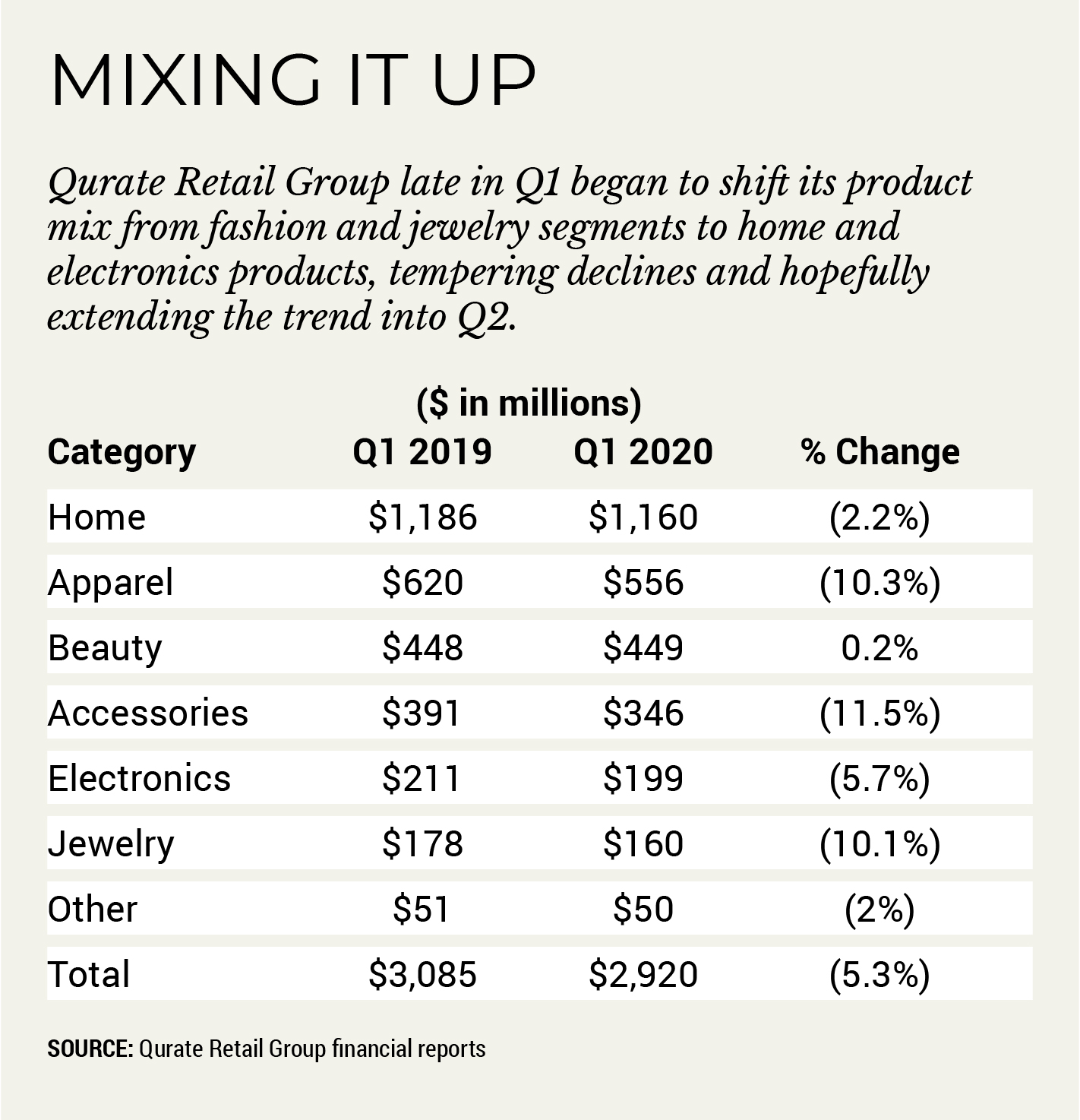Pandemic Changes Home Shopping Mix
The smarter way to stay on top of the multichannel video marketplace. Sign up below.
You are now subscribed
Your newsletter sign-up was successful
The pandemic has prompted a rise in the number of people buying products from home, but for top shopping channels like QVC and HSN, the increase in interest was a mixed blessing as customers shifted from buying high-margin offerings like fashion and jewelry to less-profitable home categories.

QVC and HSN parent Qurate Retail Group, which also includes online retailer Zulily, saw revenue in the first quarter dip about 5%, to $2.9 billion. Operating income fell 20% as the shift to low-margin offerings and an increase in costs associated with its fulfillment centers and employees during the pandemic ate into profits.
About 10,000 Qurate employees are now working from home and the company has spent about $19 million in emergency pay and benefits for its workers. Qurate has committed about $10 million to support urgent needs in its communities, including donating airtime for public-service announcements, participating in the Small Business Spotlight initiative with the National Retail Federation; a global PPE-creation project funding artisans globally with female-founded nonprofit group Nest; and relief programs like Meals on Wheels and No Kid Hungry.
Qurate president and CEO Mike George said sales began to rebound late in March and have continued into April. Qurate’s online businesses had strong showings in the quarter, with traffic on the QVC website up about 30% compared to the prior year and live streaming over social media rising 100%. Home viewership at the QVC and HSN channels was up 10% in the period.
On a conference call with analysts, George said though it is still early in the second quarter, the April growth is consistent and evident across several product segments.
“We’ve seen it across new customers, reactivated customers, occasional customers and core customers,” George said. “We’ve seen it across a range of home categories, electronic categories, beauty categories. The only place we’re not seeing it is in apparel, accessories and jewelry. So I’d characterize it as consistent, broad-based sales growth.”
The shift wasn’t exactly an accident, George added. Qurate foresaw the changes in buying habits associated with the pandemic, and tailored its message and offerings to meet them.
The smarter way to stay on top of the multichannel video marketplace. Sign up below.
Tailored to the Times
Qurate blew up most of its on-air
programming calendar, inventing new programs that would address the moment, like Love Your Home, a home-products show that replaced Beauty iQ, and airing afternoon miniseries to take advantage of an increase in viewership during that time slot.

QVC, HSN and Zulily also beefed up their home-products inventories to focus on new trending categories like home, sanitation, food and storage, business tools, tech resources for distance learning and
beautification. The company also leaned
into its social media platform, including the #PostAtHome campaign on QVC, which featured hosts live streaming from their homes, and Cornerstone Brands’ Grandin Roads #MakeYourDoorHappy, encouraging viewers to share their front door decorations on social media.
QVC and HSN saw increases in home-fitness products — sales of bikes, treadmills and ellipticals were all up — as well as vitamin supplements and home-office products like laptops, tablets, printers and monitors. Viewers also were interested in boosting connectivity with family and friends as shelter-in-place orders continued, leading to increased sales of video-calling devices like Amazon’s Echo Show and Facebook Portal.
Qurate said about two-thirds of
new customers in the quarter came in organically, reflecting the power of its brands. Now, George said, Qurate will step up marketing spending to attract and retain new customers.
“We’ve seen improved efficiency across all marketing channels, including paid social, which gives us a powerful platform to highlight our unique shopping experience and are moving quickly to convert new customers into lifetime customers with campaigns that build relationships by focusing on what makes us unique and targeted emails, digital nurturing through retargeting and the piloting of additional social channels and ad formats,” George said on the call.
Lower Margins, Higher Costs
Evercore ISI analyst Oliver Wintermantel wrote in a research note that while the April sales growth is encouraging — he revised his Q2 revenue estimates upward to a 1% decline — the mix in products to some lower-profit merchandise comes at a time of additional operating costs related to the pandemic. Wintermantel expects EBITDA margins to fall another 100 to 150 basis points in Q2.
“Consumers adapted to the new stay-at-home mandates and the company adjusted its merchandising, programming and marketing to better meet the needs of its customers,” Wintermantel wrote. “That said, the product margin pressure due to category mix shifts continued and [Qurate] is incurring further COVID-related costs — including additional pay, reduced productivity in its fulfillment centers, which is leading to increased fulfillment times and additional bad debt reserves (in anticipation of the deteriorating economic situation).”
